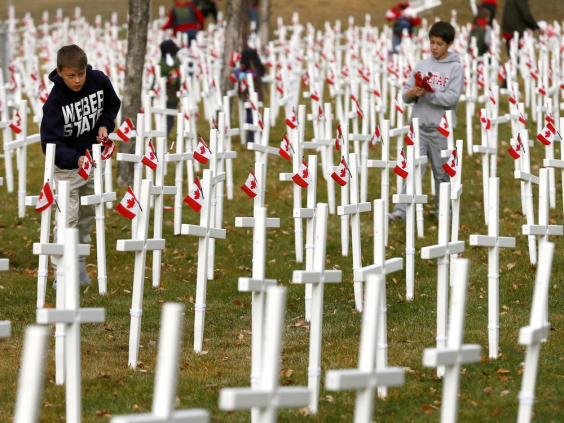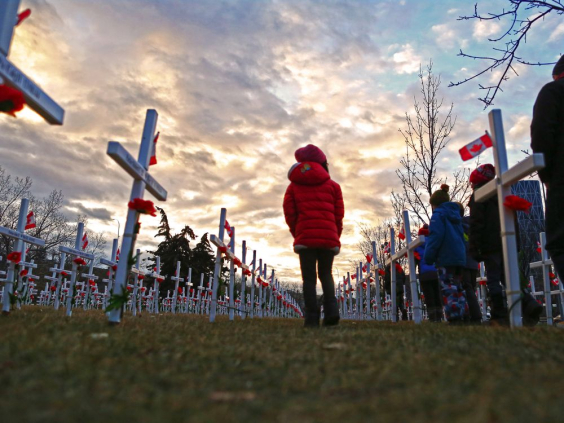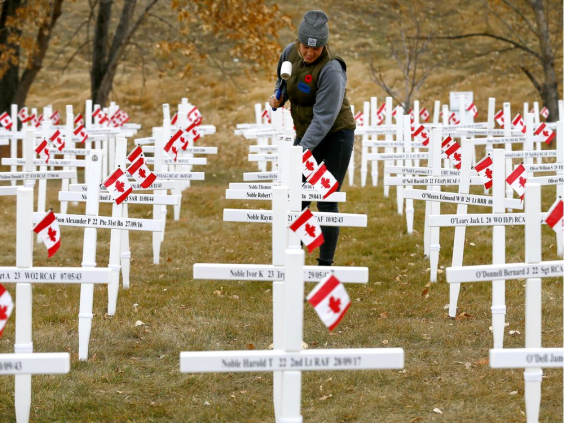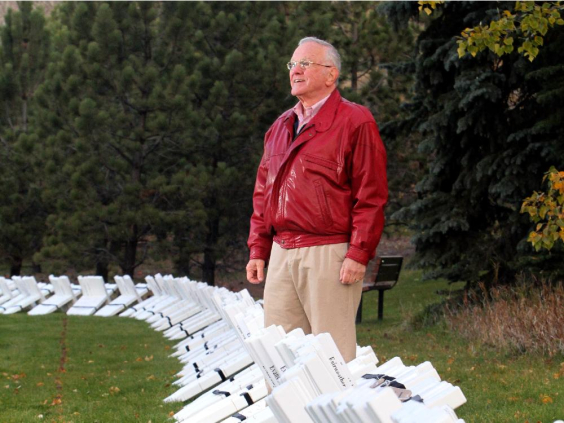On New Year’s Eve, when Murray McCann turned 80, he did what many of us do on a milestone birthday — he contemplated his mortality.
Unlike many of us, however, that reflection spurred the successful entrepreneur and sole founder and funder of Calgary’s Field of Crosses into action.
“I turned 80 and I thought, if the Field of Crosses is going to reach its 100th anniversary 89 years from now, I need to do something to make it outlive me,” McCann said with chuckle.
He didn’t waste much time and now his annual 11 Days of Remembrance that memorializes each of the more than 3,500 southern Alberta soldiers who made the ultimate sacrifice during active duty has been turned into a registered charity — The Field of Crosses Memorial Project.
Entering its 11th year, McCann says he started the project in 2009 after a visit to the U.S. southern state of Georgia.
He was driving through Menlo, a town of fewer than 500 people, when he spotted a grouping of dozens of white crosses by the roadside honouring young men from that town — many of them just boys — who died in service to their country in wars over the decades.
“It really affected me,” he recalls. “If I had just been told the number, it wouldn’t have impacted me the same way. Seeing that many crosses in that little town made me really reflect on the enormous cost of our freedom.”
Since then, with the help of hundreds of volunteers — many of them veterans — precise, military formation lines of 3,500 crosses — one for every southern Alberta soldier who died in active service during war or peacekeeping — covers a two-hectare parcel of land on the north side of Memorial Drive near the Centre Street Bridge.

It’s an arresting, moving site from a distance. But it’s a transformative experience up close.
“I walk those crosses so much and it still chokes me up every time,” says McCann.
“If you stop in front of a cross and read the inscription on that cross, if you’ll take a moment, it will talk to you. You’ll see the families who were left behind. Every cross, I like to say, has a story, a very personal and tragic story, that tells of families that are changed forever. A father who doesn’t come home, or a son who never returns.”
Each cross bears the name of a fallen soldier, their age, rank, regiment and date of death.
A veritable army of volunteers — from schoolchildren to veterans, police officers and firefighters — help prep the ground, drill the holes and then clean or replace damaged crosses. Then, from Nov. 1 to 11, sunrise and sunset services are held every day, and McCann attends them all.
There are no speeches. McCann says no words can convey the profundity of all of those heroes “who gave their tomorrows for our todays.” Children’s choirs sing a few wartime songs, a bugler from HMCS Tecumseh plays the last post, there are bagpipes and plenty of silent tears.
This year, new initiatives will make the 11 Days of Remembrance even more poignant.

On the evening of Nov. 10, a candle will be lit at sunset at the base of every cross by volunteers from St. Mary’s University.
A separate field of 120 crosses will be set up on a nearby knoll, with each cross representing 1,000 fallen soldiers who died for our freedom further representing the 120,000 Canadian soldiers who died in service during wars or peacekeeping.
Also, people can show their commitment to remembering these heroes by adopting a cross for $250. In recognition, donors will receive a personalized scroll, recognition on the website, a Field of Crosses wristband, access to the newsletter and a tax receipt.
“Like I was saying, when you hear a number, it’s just a number, but when you see one cross 3,500 times, it has a much bigger impact. There’s so many stories.”
McCann says two years ago he met an elderly man at the Field of Crosses who obviously wanted to talk.
“He said, ‘you know, I just had the most wonderful experience.’ ” He told McCann that when he was a young boy, his older brother, “who was his absolute hero,” went off to war and didn’t come back.
The man said he had always intended to visit his beloved brother’s final resting place in a war cemetery in France, but life always seemed to get in the way. University, university debt, marriage, a mortgage, children, hockey tournaments, grandchildren. Then, once he could afford the trip, he was shackled by health issues.
“He said, ‘so today I found my brother’s cross and I finally said goodbye.’ ”

McCann’s voice breaks at the recollection.
His longtime friend and the new executive director of the Field of Crosses charity, Thomas Leppard, uses the opportunity to point out that for many families, this special memorial “is really their homecoming, because they’re not here. They’re in the fields of France, or Italy — where they fell, or they were lost at sea, but they get to come home, where people can see the scale of their sacrifice and then connect with a loved one.”
McCann says he’s most excited about what he sees happening with the schoolchildren who visit the field.
He’ll watch exuberant kids get off the school bus and they’re pushing and laughing and horsing around. But then they start reading the crosses and become still and quiet.
“It’s most interesting. They divide and they do their own private journey and they come out quiet. The teachers tell us they have nothing that has near the impact on the students as those crosses do.”
Leppard says virtually everyone who visits the field “feels tremendous pride but also tremendous pain. It’s that pride and pain. It’s the salt and pepper.”
And it’s the gratitude we all feel at the gift we were all given thanks to their sacrifice.
Licia Corbella is a Postmedia columnist.

